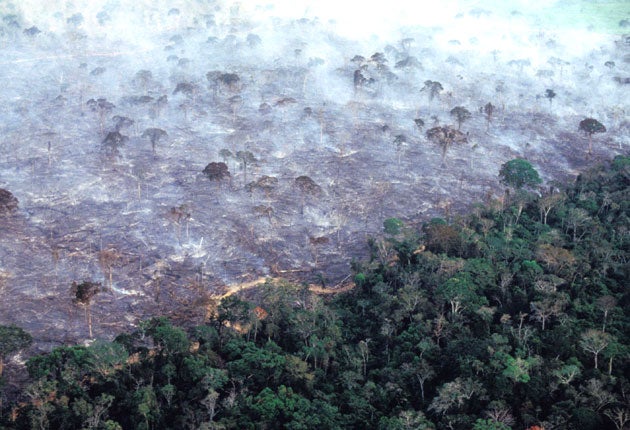Fate of the rainforest is 'irreversible'
A third of the Amazonian 'carbon sink' is doomed whether or not emissions are cut, Copenhagen conference is told

Your support helps us to tell the story
From reproductive rights to climate change to Big Tech, The Independent is on the ground when the story is developing. Whether it's investigating the financials of Elon Musk's pro-Trump PAC or producing our latest documentary, 'The A Word', which shines a light on the American women fighting for reproductive rights, we know how important it is to parse out the facts from the messaging.
At such a critical moment in US history, we need reporters on the ground. Your donation allows us to keep sending journalists to speak to both sides of the story.
The Independent is trusted by Americans across the entire political spectrum. And unlike many other quality news outlets, we choose not to lock Americans out of our reporting and analysis with paywalls. We believe quality journalism should be available to everyone, paid for by those who can afford it.
Your support makes all the difference.The impact of climate change on the Amazon rainforest could be much worse than previously predicted, new research suggests.
Even if emissions were reduced and governments managed to limit temperature rises to 2C – the current aim of international climate policy – between 20 and 40 per cent of the forest could die because of warming, a British scientist told a conference on climate change in Copenhagen yesterday.
Dr Chris Jones, of the Met Office's Hadley Centre for Climate Prediction and Research, said the Amazon may become "committed" to substantial change by rising temperatures long before any such change is apparent elsewhere.
The effect would be caused by the inertia of the Amazon's ecosystem – a phenomenon by which changes take a long time to work through the system to their fullest. This is already known to occur in the oceans, which is why sea level rise is expected to continue for centuries after any stabilisation of global warming.
The discovery that ecosystems can also be committed to large-scale changes means the danger to the natural world from the warming atmosphere may have been underestimated.
A 40 per cent loss of the Amazon rainforest, as well as being a disaster for wildlife and the people of the region, would make climate change worse because it would damage the region's ability to act as a carbon "sink", soaking up the main greenhouse gas, carbon dioxide.
The loss would be in addition to the losses presently caused by deforestation.
Dr Jones said: "Ecosystems do exhibit significant commitment to further change even after you've stabilised the climate. The Amazon forest will be committed to large-scale loss long before any is observable in the real world, so some kind of monitoring system to detect the first signs of Amazon dieback might actually be too late. We need to understand the processes responsible before that."
The computer model used to forecast forest losses showed that commitment to change came in at a temperature rise of about 1 C above the level existing before the industrial revolution in the 18th century.
Currently, global temperatures are about 0.75C above the pre-industrial level. However, scientists believe that large amounts of carbon dioxide emitted in recent years have caused further warming of about 0.6C – meaning that the world is likely to warm at least 1.3C, even if all carbon emissions were stopped immediately.
Asked if this meant Amazon dieback had already started, Dr Jones responded that it probably had. At 1.3C, the commitment to change is not great, but by C it rapidly leaps up to 20 and then 40 per cent loss of forest. At 3C – where the computer simulation shows no dieback might yet be visible – the commitment is a 70 per cent loss of the forest.
Dr Jones said these changes could be reversible only over very long time scales – perhaps hundreds of years. "On any kind of pragmatic time scale, I think we should see loss of the Amazon forest as irreversible," he added.
Despite the long-term term threat of Amazon forest dieback, Vicky Pope, the Hadley Centre's head of climate advice, said it was still important to try to continue to stop deforestation because it was leading to as much emissions being pumped into the atmosphere as the world's transport sector.
Join our commenting forum
Join thought-provoking conversations, follow other Independent readers and see their replies
Comments